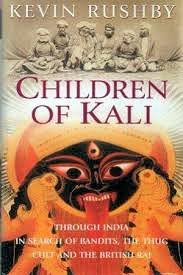 India in the mid 19th century was not a safe place to be, with violent resistance to the British Empire growing in strength. But more worrying for the traveller was the growth of the thuggee cult. This sect, so the legend goes, would befriend groups of travellers and lull them into a false sense of security before strangling them with a knotted handkerchief. The purpose was to pay homage to Kali, one of the most violent and powerful Indian gods.
India in the mid 19th century was not a safe place to be, with violent resistance to the British Empire growing in strength. But more worrying for the traveller was the growth of the thuggee cult. This sect, so the legend goes, would befriend groups of travellers and lull them into a false sense of security before strangling them with a knotted handkerchief. The purpose was to pay homage to Kali, one of the most violent and powerful Indian gods.
But the British weren’t to be cowed and in William Sleeman they had their antidote to the thuggees. In the 1830s and 1840s he made it his mission to hunt and destroy the cult and render India safe again. In the process, 3,000 were captured, of whom 466 were hanged. The thuggees were broken and Sleeman was lauded as a hero at the time and in generations of admiring history books.
Or so the story goes. Kevin Rushby sets out in search of Sleeman and the thuggees, to discover whether the legend so beloved of English schoolbooks is to be believed and whether anything remains of the cult devoted to Kali. His investigation takes him across India, from Madras and Mysore in the south to Varanasi and Kolkata in the north. Along the way he encounters a wide spectrum of Indian life, from wealthy gangsters just out of prison, to penniless holy men practising breathing exercises in Varanasi and lecherous policemen at a remote station.
The book that emerges is a fascinating mixture of history, travel and sociology, questioning not just the historical events that are now taken as fact, but also the structure and biases of modern day India and western attitudes towards the east. What sets this book apart from the mass of modern travel literature is its sense of purpose. Rushby goes in search of a legend but comes back with a far wider look at India. Often opinionated, and at times more of a history book than a travel book, Children of Kali nevertheless examines aspects of India that are rarely discussed in travel literature or anywhere else. Yet they remain as essential a part of modern India as the Hindu temples, spice markets and historical monuments that attract most visitors to the sub-continent.
Overall verdict: A modern day attempt to uncover the truth behind the Indian Thugee cult
Constable & Robinson, 2002
